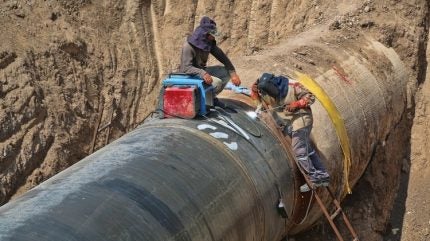
Over 260 charities have urged banks not to provide loans for the $3.5bn oil pipeline project in East Africa, citing that the 1,445km project could wreak havoc on the environment, increase carbon emissions and cause loss to community land and livelihoods.
The oil pipeline project will run from western Uganda through Tanzania to the Indian Ocean port of Tanga.

Discover B2B Marketing That Performs
Combine business intelligence and editorial excellence to reach engaged professionals across 36 leading media platforms.
French firm Total and China National Offshore Oil Corporation will commence work on the project soon.
The pipeline’s two thirds cost will be financed through debt, reported Thomson Reuters Foundation.
The charities urged the Ugandan unit of Standard Bank Group, Sumitomo Mitsui Banking Corp and the Industrial and Commercial Bank of China to cease their involvement as the financial advisors to the project.
These banks are known to be serving as advisors to the project to help secure a loan of $2.5bn for its construction, stated the charities.

US Tariffs are shifting - will you react or anticipate?
Don’t let policy changes catch you off guard. Stay proactive with real-time data and expert analysis.
By GlobalDataThe letter was signed by 263 charities, including the Africa Institute for Energy Governance, the Alliance for Food Sovereignty in Africa, Greenpeace and Friends of the Earth.
Diana Nabiruma from the Africa Institute for Energy Governance said: “In light of the climate change crisis, many countries have made commitments to clean up their energy systems by promoting renewable energy.
“No responsible bank should finance the East African Crude Oil Pipeline (EACOP) project well knowing that the economic, environmental, climate change and social risks of the project are too immense.”
A letter signed by the charities urged 23 other banks to not finance the project.
Landlocked Uganda expects to accelerate this project to revive the economy, which has been impacted significantly due to Covid-19 pandemic.
According to the charities, around 14,000 families are likely to lose their land if the pipeline project went ahead as it could pass through over 400 villages in Uganda and Tanzania.
Furthermore, almost one third of the pipeline will run through Lake Victoria.
Over 40 million people from countries including Kenya, Uganda, Tanzania and Burundi depend on this lake for water and food production.
The project is also expected to cut across 200 rivers, thousands of farms and vital wildlife reserves.
It will also lead to 34 million tonnes of carbon emissions due to transportation of oil, the letter stated.



